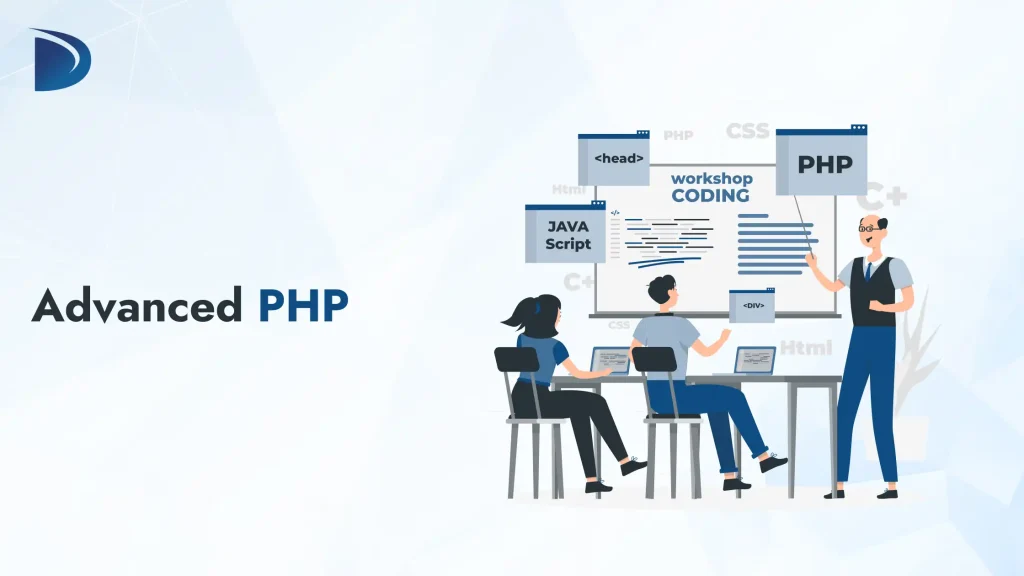Table of Contents
PHP has come a long way from powering simple contact forms and guestbooks. These days, it’s running enterprise apps, headless APIs, and full-blown SaaS platforms. If you’ve ever asked yourself what Advanced PHP is, this is it. It’s not about memorizing syntax or using more functions. It’s about building smarter, faster, and more secure systems with clean architecture, reusable code, and performance in mind.
This guide is for developers ready to move beyond basics and dive into the real power of PHP. We’re covering everything that makes PHP a force to be reckoned with in this day and age. Let’s get started.
Rethinking PHP in Modern Development
PHP has come a long way from being just a basic scripting language used for simple contact forms or blog templates. Today, it’s a pillar in modern backend development, powering complex ecosystems like Facebook, WordPress, and enterprise-level SaaS platforms. Developers now rely on PHP not just for its speed and flexibility, but for the rich ecosystem and mature tooling it offers.
So, what is advanced PHP in today’s context? It’s a shift from procedural logic to scalable, secure, and maintainable architecture. It means using PHP to write modular code, build RESTful APIs, manage complex databases, and work with frameworks that support clean coding standards. Advanced PHP development is less about writing more code, and more about writing it smarter, with structure, intention, and long-term maintainability in mind.
Going Beyond the Basics
Once you’ve mastered syntax, control structures, and basic functions, PHP becomes a foundation for building sophisticated applications. This stage is where advanced PHP concepts begin to shape your thinking and your code.
Object-oriented programming (OOP) becomes important: classes, inheritance, interfaces, traits, and polymorphism form the basis of reusable, modular architecture. You also start to apply SOLID principles to keep your code extensible and maintainable. Dependency injection, type hinting, and namespacing are essential practices for building production-ready systems.
Beyond that, exception handling, custom error logging, and secure session management all take center stage. Advanced PHP is about writing code that’s predictable, testable, and easier to evolve as requirements grow.
From Concept to Implementation
Understanding theory is important but applying it in real projects is where growth happens. Once you grasp the core principles, the next step is translating those PHP advanced concepts with examples that reflect real use cases, things like user authentication systems, file upload handlers, or API-driven dashboards.
Take dependency injections, for example. It’s become incredibly useful when building scalable services that require loosely coupled components. The same goes for traits and abstract classes; these features shine when refactoring large codebases or building plugin-based systems.
Here’s where PHP advanced code examples play a key role. For example, creating a service class that interacts with a third-party API using Guzzle, handling responses with exception blocks, and logging errors via Monolog shows how advanced concepts come together in practical development.
Building for Scale and Structure
When projects grow, structure matters more than speed. Scripts stitched together quickly won’t hold up in production. Advanced PHP application development introduces patterns like MVC, service layers, and dependency injection to help build scalable, organized codebases.
Using Composer for package management, following PSR standards, and adopting frameworks like Laravel or Symfony gives your app the foundation it needs to grow cleanly. With these practices, your PHP code becomes easier to maintain, extend, and deploy, no matter how complex the project becomes.
Power Features Worth Mastering
Once you’re comfortable with structure and design patterns, it’s time to tap into some of PHP’s most powerful features. They are essential tools that can simplify complexity, boost performance, and give you more control over your code. So, what are some of the advanced features of PHP? Here’s a quick overview:
| Features | Why It Matters |
| Generators | Handle large datasets efficiently without loading everything into memory. |
| Traits | Share common functionality across classes without inheritance limitations. |
| Anonymous Classes | Useful for quick, one-off objects definitions, especially in testing scenarios. |
| SPL (Standard PHP Lib) | Provides advanced iterators, data structures, and interfaces for cleaner solutions. |
| Reflection API | Enables dynamic analysis of classes and methods, vital for frameworks and tooling. |
| Type Declarations | Brings more reliability to function signatures and return values. |
| Attributes (PHP 8+) | A modern way to annotate code for frameworks, routing, validation, and more. |
These features give experienced developers the flexibility to write clean, efficient, and future proof code, key skills in advanced PHP development.
Connecting the Web with Advanced Techniques
Modern PHP is a powerful engine for web connectivity. From powering APIs to integrating with third-party services, PHP plays a vital role in how applications interact over the internet.
So, what advanced internet techniques can be accomplished with PHP? A lot more than most expect:
- Building RESTful APIs using native PHP or frameworks like Laravel and Slim.
- Consuming external APIs with tools like Guzzle.
- Handling webhooks in real time to process updates from services like Stripe or GitHub.
- Generating dynamic JSON or XML responses for frontend apps or mobile clients.
- Creating token-based authentication systems using JWT for secure user sessions.
- Implementing OAuth integrations to connect with platforms like Google or Facebook.
Practical Project: Designing a Smarter Comment System
To bring theory into action, let’s look at a practical challenge: building a dynamic, secure, and user-friendly comment system. If you’ve ever wondered how to create an advanced comment system using PHP and MySQL, here’s what goes into it:
- Nested replies for threaded discussions using parent-child relationships in your database.
- AJAX-based submission to post comments without refreshing the page.
- Validation and sanitization to prevent XSS or SQL injection.
- User authentication so only logged-in users can post or edit.
- Moderation and approval workflows for managing spam or abuse.
- Pagination and sorting for handling large volumes of comments efficiently.
Tools, Testing, and Best Practices
Advanced development is about how you build it. Tools and best practices play a huge role in making your code maintainable, secure, and production ready.
In the world of advanced PHP programming, testing becomes non-negotiable. PHPUnit is the go-to testing framework for writing unit and integration tests, while tools like Mockery and Pest streamline the process for modern PHP workflows.
Static analysis tools like PHPStan or Psalm help you catch bugs before runtime, and code formatters like PHP CS Fixer ensure consistent styling across your team. You’ll also want to use Composer for dependency management and leverage version control with Git from day one.
True PHP advanced programming is about discipline, following coding standards, writing clean, modular code, and setting up CI/CD pipelines to automate deployments and testing. These practices help reduce technical debt and ensure long-term stability, no matter how complex the application becomes.
Conclusion
Advanced PHP is the difference between writing code that works and building systems that scale. It’s about thinking long-term, writing cleaner code, and using the right tools to solve real problems.
If you’re planning to build something powerful, or need help leveling up an existing PHP project, Differenz System has your back. We know the ins and outs of advanced PHP development and can help you bring structure, speed, and stability to your application.
FAQs
Can PHP be used effectively with modern frontend frameworks like React or Vue?
Yes. PHP works well as a backend API provider, serving data to frontend apps via REST or GraphQL. Tools like Laravel Sanctum or Passport help with secure integration.
Is performance an issue with PHP in high-traffic environments?
Not when optimized properly. Using OPCache, query optimization, caching strategies, and asynchronous processing can significantly improve PHP performance.
How do I handle asynchronous tasks in PHP?
While PHP is traditionally synchronous, asynchronous behavior can be achieved using libraries like ReactPHP or frameworks such as Swoole. For task queues, Laravel’s job system with Redis or Beanstalkd is commonly used.

